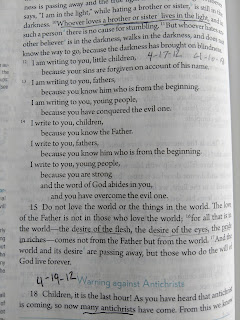Observation: As punishment for unfair economic practices, God promises to send a famine on Israel. But this isn't a famine like any other they have experienced. In this famine, it won't be food or water people are going without. It'll be a famine of God's word. It's strange to think that God, who loves us, who knows us and wants us to know God, would ever cut off communication and let us go hungry. But in a time like the time of Amos, where hearing God's word is apparently not helping the people live with love for their neighbors, maybe the silent treatment is the only way to get people listening again.
Application: I know I'm not the first modern observer to say this, but today definitely feels like a time of famine for God's word. Organized religion is declining in Europe and North America. The single fastest growing religious affiliation is "none". And in response, I'm going to say something that some may find shocking: Maybe all this is from God.
It could be that if we're going to use God's word to do more harm than good to ourselves and our neighbors, then maybe it's time for a famine of God's word. I'm not one of those people rooting for the end of Christianity as we know it, because I believe in my heart that we can do a lot more good together than we could individually. I don't want churches to die. But I would be okay if empty piety did. I don't want our world to feel that God has fallen silent. But it would be a huge a relief if religious bullying did.
My point is, you can't have a "famine" of something you don't need in the first place. So right now, society is asking, "do we need God's word?" Well, do we? Is all of this true? Is this faith we've found, this Good News we've heard, really able to change our hearts? To change the world? Does the Gospel matter? In the core of my being, I believe it does. I will gladly bet my life a thousand times that it does. But if I'm right, God's word will speak for itself. God does not require any more judges or enforcers to make people believe, as if I or anyone else ever could. If this famine is from God, the feast will be, too.
Prayer: God, speak to us. May your word fill and transform my life, and speak through my life to others who are hungry and thirsty for another way: your way. Amen.























